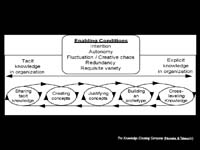These are notes from my presentation at the Hawaii International Conference on System Sciences (HICSS) #45.
I’ll link to my full paper when it is available and to subsequent posts as I publish them.
Agile values, product innovation and the shortage of women software developers Part 3 of 7

I. Nonaka and H Takeuchi. The Knowledge Creating Company. New York, NY. Oxford University, 1995
(20) How would having women on dev teams help software better address the needs of women
For this, I’ll lean on the research of Nonaka Ikujiro and Takeuchi Hirotaka . This slide is an illustration of their concept of the product development cycle in serially innovative companies. It requires the creation and sharing of two kinds of knowledge within the organization. Explicit knowledge – that which we can explain in words – and tacit knowledge – that which can best be expressed by doing. This concept of knowledge creation and techniques for forming teams that support it are the roots of the most widely adopted Agile process framework, Scrum[39]. Nonaka and Takeuchi emphasize that an enabling condition for sustained innovation is, requisite variety, having a product team made of members with different backgrounds, perspectives and motivations. Requisite variety applies to cross-functional teams but also to team members with diverse life experience. Because it is through life experience that we acquire tacit knowledge.

T. Oshita, et. al. Bread Baking Machine. US Patent Office, 2004
(21) Matsushita Example of Tacit Knowledge
The classic example of the incorporation of tacit knowledge into a disruptive product design is the first Matsushita bread machine. It took a hands on experience of baking bread by one of the product engineers (a woman) to crack how to implement the mechanics of kneading dough in a bread maker.

(22) Team diversity and delivering value
Women are significant customers and influencers in the buying decision for software and software dependent technology. Statistically, women have different perceptions and preferences for software. Therefore, according to knowledge creation theory, it is a competitive advantage to have women individual contributors bring their tacit knowledge to software product development.
Next: Do Agile principles demand we confront the shortage of women developers…
Previous: Are women are under-served by software?
All slides published to date.
There is abundant research on the problems women face in our field. I would love researchers to jump in on whether Agile principles and Agile practioners can really make a difference.
I’d also love any suggestions of organizations, institutions and individuals I might reach out to for more information, collaboration, or to take up the cause.
Please comment on my proposal to Agile 2012.
The full citation list for my paper.



